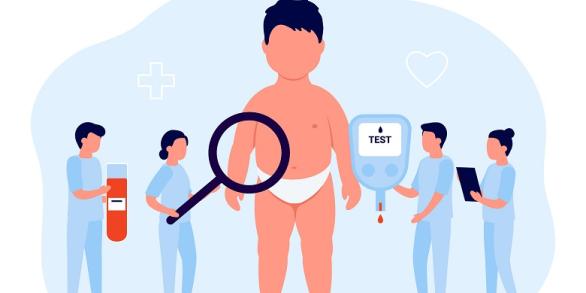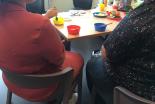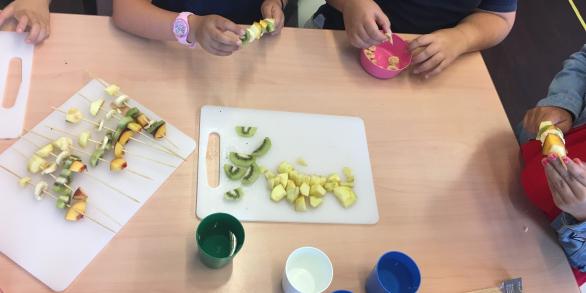We're hiring ! Join us and make a difference in our hospitals
Obesity

What is obesity?
Being overweight means having an excessive fat accumulation.
This excess weight is calculated on the basis of the BMI (Weight (kg) / Height (m²)). This is plotted on a curve that takes into account the child's age and sex.
Although being overweight is not considered to be an illness in itself, if action is not taken it can lead to obesity which is indeed an illness and that can engender comorbidities.
There are any causes of being overweight or obese and these depend on the individual child. Lifestyle and socio-environmental, medical (genetic, hormonal, medication, etc.) and psychological factors can all play a part. It is therefore essential to propose a treatment that is adapted to each child, taking into account the child and family in their totality.
To benefit from INAMI/RIZIV reimbursement to follow a dietary care pathway at the Children's Hospital a prescription from the paediatrician or doctor is required.
In other cases, it is possible to obtain a document from your mutual insurance company to benefit from a reimbursement of costs.
Support
A child who is overweight before puberty runs a high risk of remaining overweight as an adult. Today we also know that the consequences of obesity (risk of developing cardiovascular disease, diabetes, orthopaedic problems, etc. that can also have implications for self-image, social isolation, anxiety and depression, etc.) are already present in a large proportion of obese children.
As obesity is multifactorial, effective treatment must be multidisciplinary. Our team is therefore made up of doctors, a child psychiatrist, a psychologist, dietitians and a physiotherapist. Each professional acts for the well-being of the child, accompanying, supporting, assisting and motivating the child throughout the care pathway.
The care is focused on the individual patient in terms of what he or she is prepared to commit to: sport, diet, psychological counselling, while not forgetting the family.
Advice for parents
Given the multifactorial dimension of this health problem, the family and entourage play a fundamental role in this illness that is not always recognised as such.
As motivation must be sustained over a long period, habits and lifestyle must be reviewed.
Some advice to get the treatment off to a good start:
- Get enough sleep
- Eating habits: always eat at the table, slowly and stopping when you are no longer hungry.
- Combat sedentariness: move, keep screen time to a minimum




Focus
What are the procedures for being treated at the Children's Hospital?
A first appointment is made with a dietitian (or paediatrician) to make an initial assessment. He or she will explain to the child and family the possible treatment and the various tools that are available.
Depending on the degree to which the child is overweight, a care pathway will be proposed as an outpatient or during hospitalisation. The care will be adapted and personalised depending on the cause(s) and effects of the excess weight.
Group care is also available, with the aim to introduce an element of fun within a kindly and welcoming space.
We also propose "sports workshops" that can be one-to-one with a physiotherapist or within a group. Every Wednesday, Brussels Football proposes free training for young overweight patients (mixed boys and girls).
The goal set is not rapid weight loss but dietary re-education for the whole family to produce significant effects in the long term.
